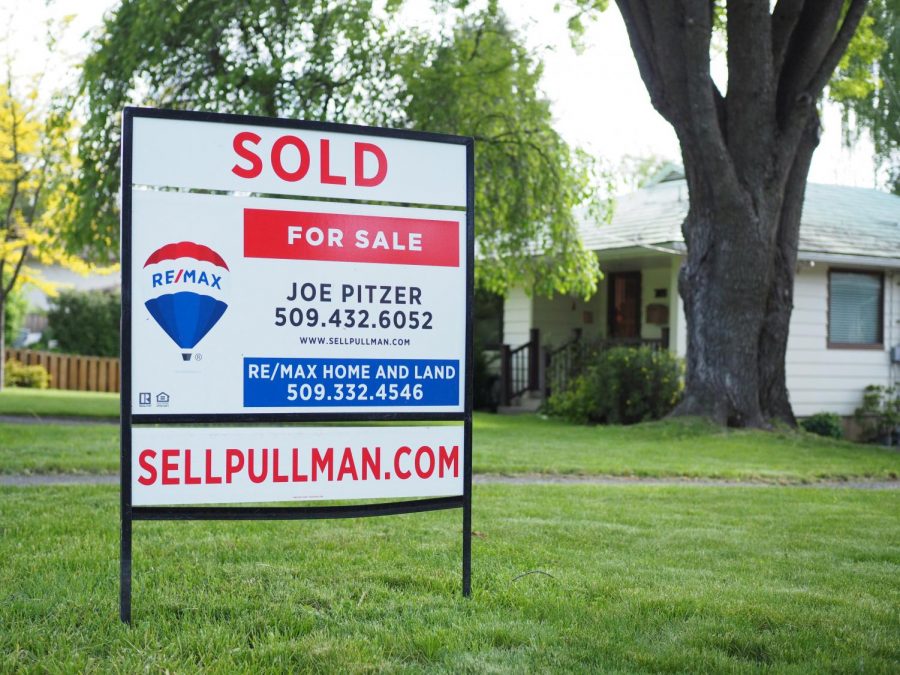Housing market slows during usual peak time of sales
Tenants still signing apartment leases in anticipation for fall amid COVID-19
In Whitman County, buyers can now visit potential homes one-on-one with a realtor rather than looking at pictures online.
May 31, 2020
With COVID-19 impacting many aspects of life, people are still buying houses and signing apartment leases.
The housing market slowed down because of the shutdown. This is typically the busiest time of year to sell a house, said Michael Gordon, owner and broker at Summit Realty Northwest.
“The bottom line is that people still need a place to live, regardless of the shutdown, regardless of the virus,” Gordon said.
As of May 27, there were 86 houses for sale and 98 houses that are in the middle of being sold in Whitman County, according to the Pacific Regional Multiple Listing Service (PACMLS).
The following are statistics from the PACMLS, which is a database where all brokered housing listings are shared. It is owned jointly by the Whitman County Association of Realtors, the Tri-City Association of Realtors, and the Lower Yakima Valley Association of Realtors, Gordon said.
From January 1, 2020 to May 27, 2020, there were 139 houses sold in Whitman County, according to the database. In the same period in 2019, 148 houses were sold in the county.
Gordon said brokers are able to do much of their day-to-day work online, including writing contracts and getting signatures digitally.
However, the buyer must sign physical documents, which typically requires notarized signatures, to complete the sale, he said. In almost every case, the potential buyer also visits the property instead of just looking at it online.
During Phase 1, the real estate industry was considered essential, but there were new guidelines, Gordon said. At any one time, only one real estate agent or broker could walk through a vacant house with one other individual.
Now that Whitman County is in Phase 2, two people can walk through a house with a broker, Gordon said.
When it comes to apartments, fewer people have been signing leases during the pandemic for current move-in dates from apartments managed by DABCO Property Management, said COO of DABCO Pete Chittenden.
That being said, people have been signing leases for future move-in opportunities, including June through September, he said.
He said he estimates the company has handled about 15 to 20 percent more leases than usual during the pandemic.
Chittenden said he thinks it is because more people are renewing their leases rather than searching for a new place to live. People who do not currently live in apartments managed by DABCO are also signing leases.
Just after COVID-19 had started affecting most people in the U.S., about 8 to 10 people in a two-week period called DABCO and said they did not have to pay rent, Chittenden said. They said DABCO had to let them out of the lease. Neither of those things were true.
DABCO is following the moratorium Gov. Jay Inslee put in place. People must pay their rent, but if they are having trouble paying it, there is a grace period, Chittenden said. They can work out a payment plan with DABCO.
“However, what we’ve found is the majority of folks pay their rent on time and each time,” he said.
Chittenden said a fluctuating number of tenants, about 3 to 8 percent, are unable to pay their rent. DABCO has been affected financially because some people are not paying rent due to the moratorium.
“When rents aren’t being paid, it makes it difficult for us to be able to pay our employees,” Chittenden said.
Fortunately, the impact has not been large enough to affect employees, he said.
Now that Phase 2 has started, DABCO can officially open its offices, Chittenden said. The company has decided to wait until mid-June so people stay safe. Employees are working remotely.
“[COVID-19] has changed the way we go about business, but it has not affected us negatively in the sense that we’re unable to do business,” Chittenden said.









